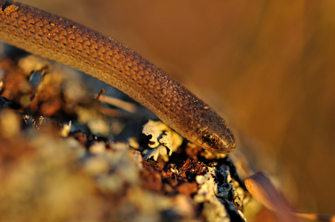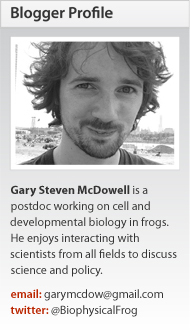-
October 21, 2015
Advocating for changes to science at Future of ... -
September 19, 2015
Chicago Postdocs To Discuss Training, Science P... -
September 13, 2015
Listening to our universe with gravitational wa... -
June 09, 2015
Science Visualization at the VIVID Festival -
April 20, 2015
Postdoc Advocates Step Into the Spotlight at Na... -
March 19, 2015
Conferences to engage and build communities -
February 27, 2015
The Organization and Execution of a Postdoc-Run... -
January 19, 2015
Scientific Meetings and Advocacy: same place, d... -
December 27, 2014
The Future of Research Symposium -
November 10, 2014
Join the Twitter Chorus -
July 03, 2014
More than Just Meetings - Xenopus, Advanced Ima... -
June 26, 2014
Singer for your Supper - BYG2014 Singer Session -
June 26, 2014
A yeast-y world view - British Yeast Group 2014... -
May 31, 2014
A New View on Life - BioVisions (#BVA2014) -
April 26, 2014
55th Annual Drosophila Research Conference (#Dr... -
April 04, 2014
SynBio Future - Synthetic biology for the masses! -
March 17, 2014
Science. Polish Perspectives (#SPP2013) -
February 17, 2014
2013 ASCB Annual Meeting - #ASCB2013 -
December 02, 2013
Science Online: Oceans - #SciOOceans -
November 25, 2013
Molecular Biology & Pathogenesis of the Clostri... -
September 20, 2013
Science Online Climate - #SciOClimate -
August 17, 2013
Let's go round again - One year of Conference C... -
August 07, 2013
Communicating Science 2013 (ComSciCon13) -
July 25, 2013
International Society for Stem Cell Research 20... -
July 11, 2013
#pombe2013 - 6 days in 6 ways: Saturday/Mindmaps -
July 10, 2013
#pombe2013 - 6 days in 6 ways: Friday/Twitter -
July 09, 2013
#pombe2013 - 6 days in 6 ways: Thursday/Blogging -
July 08, 2013
#pombe2013 - 6 days in 6 ways: Wednesday/Headlines -
July 05, 2013
#pombe2013 - 6 days in 6 ways: Tuesday/Scribing -
July 04, 2013
#pombe2013 - 6 days in 6 ways: Monday/Instagram -
June 08, 2013
Getting Together: Science Speed Dating -
May 31, 2013
Scientific Vision: Imagery in Science & Confere... -
May 24, 2013
BSA Science Communication 2013 (#SciComm2013) -
May 19, 2013
Science mojo: Gradually diminished, instantly r... -
May 01, 2013
Flying High - 54th Annual Drosophila Research C... -
April 01, 2013
Spring Conferences 2013 - April -
February 19, 2013
SpotOn NYC (SONYC) - Doodling Science -
January 01, 2013
Falling Walls Lab Berlin 2012 - Competition -
December 30, 2012
Falling Walls Lab Berlin 2012 - Preliminaries -
December 29, 2012
Falling Walls Lab Berlin 2012 - 3 minutes, 1 day -
December 17, 2012
Science. Polish Perspectives (SPP2012) -
December 08, 2012
21th International Colloquium on Magnetic Films... -
December 03, 2012
SpotOn London 2012 (#solo12): Starting a Conver... -
November 25, 2012
SpotOn London 2012 (#solo12): Connecting the Dots -
November 24, 2012
SpotOn London 2012 (#solo12): How Fringe Sessio... -
November 18, 2012
14th Xenopus International Conference - Days 4 & 5 -
November 15, 2012
14th Xenopus International Conference - Days 1 ... -
October 10, 2012
European Conference on Computational Biology (E... -
October 08, 2012
European Conference on Computational Biology (E... -
September 28, 2012
The International Conference on Science Communi... -
September 21, 2012
4th International Congress on Stem Cells and Ti... -
September 17, 2012
ESA2012 - Through the magic of Twitter-vision -
September 17, 2012
Ecological Society of America (ESA) 2012 - In R... -
September 10, 2012
European Conference on Computational Biology (E... -
September 07, 2012
FASEB - Protein Folding in the Cell -
August 17, 2012
Hermes 2012 - A Scientific Surprise -
August 14, 2012
UKCSJ - UK Conference of Science Journalists -
August 12, 2012
IWPCTM13 - International Workshop on the Physic... -
August 10, 2012
Looking Ahead - Conferences in Aug/Sept 2012 -
August 09, 2012
Conference Cast Reloaded -
September 14, 2011
EMBO conference - day four -
September 13, 2011
EMBO conference - day three -
September 12, 2011
EMBO conference - day two -
September 11, 2011
EMBO conference - day one -
July 17, 2011
SFAM conference - day four -
July 16, 2011
SFAM conference - day three -
July 14, 2011
SFAM conference - day two -
July 14, 2011
SFAM conference - day one -
June 21, 2011
Structural Systems Biology Conference - Part II -
June 20, 2011
Structural Systems Biology Conference - Part I -
May 07, 2011
BSCB-BSDB Spring Conference - Day 4 -
May 05, 2011
BSCB-BSDB Spring Conference - Day 3 -
May 03, 2011
BSCB-BSDB Spring Conference - Day 2 -
May 02, 2011
BSCB-BSDB Spring Conference - Day 1 -
April 19, 2011
Society for General Microbiology Conference - S... -
April 11, 2011
SciBarCamb2011 -
March 18, 2011
OMNG - Day 3 -
March 16, 2011
OMNG - Day 2 -
March 15, 2011
OMGN - Day 1 -
February 12, 2011
SciOnline - Student Reflections III
« Prev « Prev Next » Next »




 This
conference, which was attended by people from over 60 countries, had the aim of
equipping both scientific researchers and PhD students with the skills to
communicate their research to a wider audience.
This
conference, which was attended by people from over 60 countries, had the aim of
equipping both scientific researchers and PhD students with the skills to
communicate their research to a wider audience. The
members of the writing workshop group were paired up and given the task of
writing a press release about the other person’s research. I was lucky enough
to be paired up with an ecologist who was studying a rather bizarre creature native
to Australia known as the endangered pink-tailed worm lizard (Aprasia parapulchella). He was
investigating the environmental factors leading to its demise and using these to
create a model to predict which areas are most suitable or unsuitable for its
conservation – fairly easy to grab people’s interest with a press release. Unfortunately
for him he had to get his head around the slightly abstract protein that I’m
studying for my PhD. We exchanged articles at the end to see what we had come
up with and to my astonishment I appeared to be “curing” a whole host of
medical conditions! Amazing really, since I believed I was just studying the
contribution of a small proton pump within a cell.
The
members of the writing workshop group were paired up and given the task of
writing a press release about the other person’s research. I was lucky enough
to be paired up with an ecologist who was studying a rather bizarre creature native
to Australia known as the endangered pink-tailed worm lizard (Aprasia parapulchella). He was
investigating the environmental factors leading to its demise and using these to
create a model to predict which areas are most suitable or unsuitable for its
conservation – fairly easy to grab people’s interest with a press release. Unfortunately
for him he had to get his head around the slightly abstract protein that I’m
studying for my PhD. We exchanged articles at the end to see what we had come
up with and to my astonishment I appeared to be “curing” a whole host of
medical conditions! Amazing really, since I believed I was just studying the
contribution of a small proton pump within a cell. 

















